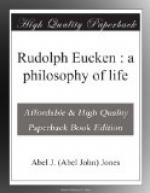What is religion? Most people perhaps would apply the term to a system of belief concerning the Eternal, usually resting upon a historical or traditional basis. Others would include in the term the reverence felt for the Absolute by the contemplative mind, even though that mind did not believe in any of the traditional systems. Some would emphasise the fact that religion should concern itself with the establishment of a relationship between the human and the Divine.
But Eucken does not find religion to consist in belief, nor in a mere attitude towards the mysteries of an overworld. In keeping with the activistic tone of his whole philosophy he finds religion to be rooted in life, and would define religion as an action by which the human being appropriates the spiritual life.
The first great concern of religion must be the conservation—not of man, as mere man, but of the spiritual life in the human being, and it means “a mighty concentration of the spiritual life in man.” The essential basis that makes religion possible is the presence of a Divine life in man—“it unfolds itself through the seizure of this life as one’s own nature.” Religion must be a form of activity, which brings about the concentration of the spiritual life in the human soul, and sets forth this spiritual life as a shield against unworthy elements that attempt to enter and to govern man.
The essential characteristic of religion must be the demand for a new world. “Religion is not a communication of overworld secrets, but the inauguration of an overworld life.” Religion must depend upon the contradiction and opposition that exists in human life, and upon the clear recognition of the distinction between the “high” and the “low” in life. It must point to a means of attaining freedom and redemption from the old world of sin and sense, and to the possibility of being elevated into a new and higher world. It must, too, fight against the extremes of optimism and pessimism, for while it will acknowledge the presence of wrong, it will call attention to the possibility of deliverance. It must bring about a change of life, without denying the dark side of life; it must show “the Divine in the things nearest at hand, without idealising falsely the ordinary situation of life.”
The great practical effect of religion, then, must be to create a demand for a new and higher world in opposition to the world of nature. For this new life religion must provide an ultimate standard. “Religion must at all times assert its right to prove and to winnow, for it is religion—the power which draws upon the deepest source of life—which takes to itself the whole of man, and offers a fixed standard for all his undertakings.” Religion must provide a standard for the whole of life, for it places all human life “under the eternity.” It is not the function of religion to set up a special province over against the other aspects of his life—it must transform life in its entirety, and affect all the subsidiary aspects.




